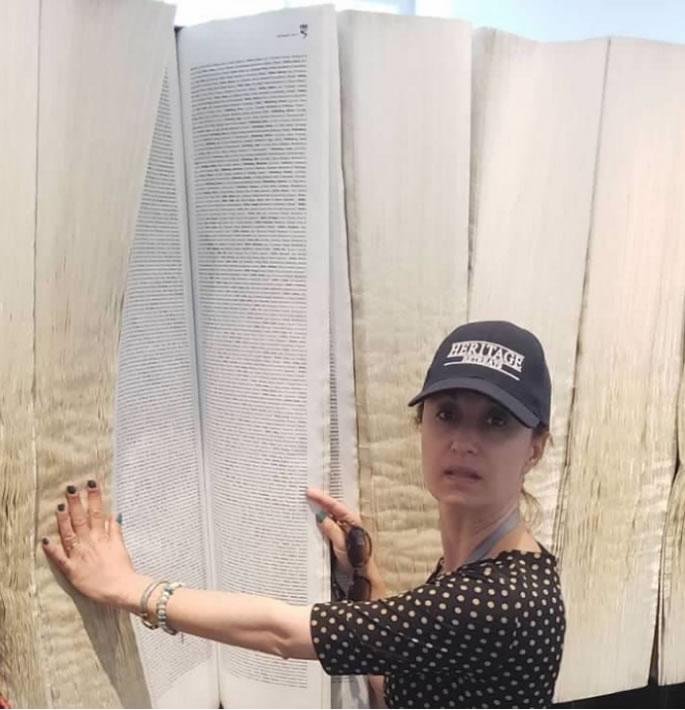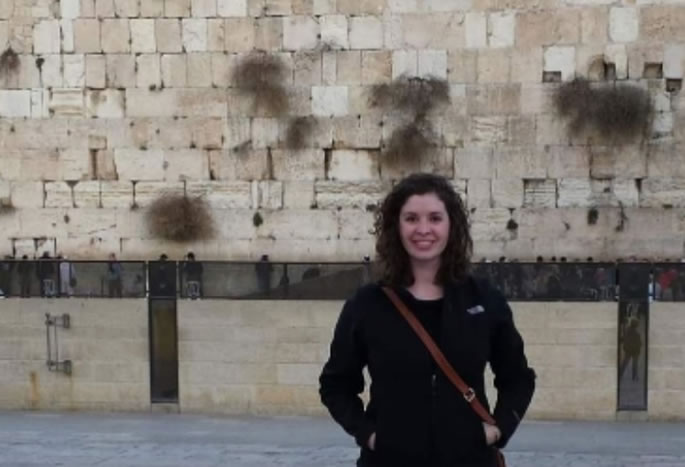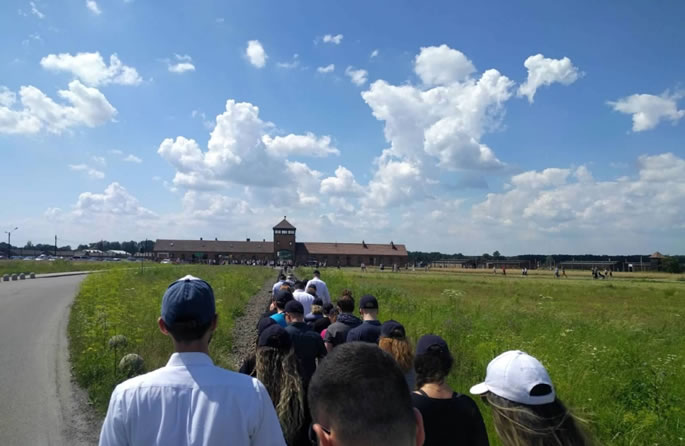In July of 2018, my husband and I joined the Heritage Retreats on an emotional journey to Poland. As our group traveled from Majdanek to Auschwitz-Birkenau to mass graves hidden in the forest, we cried, prayed and said Kaddish for the dead.
Born in the former Soviet Union, I grew up with stories about my great-grandparents, Nochum and Chaya Rabovetsky. At the beginning of World War II, my great-grandparents, together with their 11-year-old youngest son, evacuated their home in Vinitsya, a small city in Ukraine, to escape the incoming German army. Tragically, Nochum was killed on the way. His wife and son were sent to the ghetto, where Chaya met her end. They have no graves.
In Auschwitz, I was astonished to see the names of my great-grandparents in the archive room, among millions of those who perished in the Holocaust. After crying for the Bubby and Zaidy I never knew, I promised myself to be a living legacy as I recommitted myself to a life of Torah values.
On the last night of our trip, one of the other participants, Rayanne, opened up about her own story of return.

Rayanne was born in Colorado Springs, Colo., in November of 1988. Living as a traditional Christian family, her parents weren’t aware of any Jewish connection in their heritage. Rayanne was raised with a strong work ethic and family values. When she was in high school, her uncle researched their history and discovered that Rayanne’s great-great-grandmother, Catherine, on her mother’s side, was Jewish. Apparently, in the late 1800s, this young girl fell in love with a German boy and wanted to marry him. The German family was very well-off, and to avoid conflict and public scrutiny, they sent the couple away to the United States. Catherine and her husband had a daughter, Marie, who grew up and married a Christian. Marie also had a daughter, Mary, who was not familiar with her Jewish roots and also married a non-Jew. Mary is Rayanne’s grandmother.
After her uncle shared his discovery, the family continued living the same life as before. There are very few Jews in Colorado Springs, so learning about Jewish traditions wasn’t simple.
We were listening to Rayanne’s story with curiosity. She was celebrating Shabbat with us, so I was eager to find out how she found her way back to the Jewish people.
Her uncle’s news lay dormant for a few years, until Rayanne was ready to leave for college. Shortly after she arrived at the Northern Arizona University, she began to look for a job. She saw an advertisement for “event help, house work, help with kids” and scheduled an interview.
When she arrived at the house,“The door was opened by a guy with a long beard dressed in mostly black. I was confused because the two-and-a-half-year-old boy who was running around looked like a girl with his long curly hair.”
Rayanne had found the Chabad House on the campus of her university, run by Rabbi Dovie and Chaya Shapiro.
“At the interview, I sat down with the lady of the house, Chaya. She explained that they were the rabbi and the rebbetzin, and they needed help with events on Shabbat.” They were looking to hire a non-Jewish person to help with the things that a Jew was not allowed to do on the sacred day.
At the time, Rayanne had no idea about these things but felt that it was important to share that she was Jewish. At that, Rebbetzin Chaya invited Rayanne to the Chabad House dinners and events. Rayanne was intimidated by this offer, clarifying, “I don’t know any rules.”
A short while later, she received a call from Chaya asking her to help with the children and some housework three days a week. She explained that as a Jew, Rayanne wouldn’t be able to perform any work that would violate Shabbat, but she could help the family and the Jewish students at the Northern Arizona University.
Chaya remembers, “I always ask the people I interview if they’re Jewish, so I know what I can ask of them on Shabbat and holidays. When I asked Rayanne if she was Jewish, she said she had found out that she had Jewish ancestry but didn’t really consider herself Jewish. I asked on which side of the family and she said her mother’s side. That’s when I told Rayanne that this makes her 100 percent Jewish and invited her to our Chabad events. We liked her so much, and it seemed like she would be great with the children, so we offered her a job, and found someone else to help out on Shabbat and holidays.”
Over the next five years, the Chabad House became Rayanne’s second home. Every week, she joined Shabbat meals with another 20 to 40 people, growing in her knowledge and observance. She attended Torah classes and learned the prayers.

Through Chabad, Rayanne joined the Sinai Scholars Program that concluded with her trip to Israel, where she received a scholarship for Israel Links. She also went to a Campus Shabbaton weekend in Crown Heights.
“For the five years that I was at the university, I worked and learned from Chaya and Dovie. Without any prior Jewish education, I learned how to run a Jewish household. It was the best informal Jewish education. I learned the laws of koshering, about the holidays, the prayers, and even cooked the traditional Shabbat cholent with Dovie. Yet, I wanted to learn more.”
We were listening to Rayanne avidly. As a group, we had witnessed so much destruction and horror on this trip. Yet Rayanne’s story assured us that nothing was lost forever.
Every human being is an entire universe. By extending kindness to one person, we change the world. This selfless Chabad couple that embraced this Jewish girl could not envision the effect they had on us, sitting at the Shabbat table on our trip thousands of miles away in Poland. We can count the number of apples on an apple tree, but we can never know how many trees will grow from the seeds hidden in each apple.
Rayanne continued, “Chaya and Dovie gave everything to the students, and they did it with a smile. After graduation, I did a three-month summer program at Mayanot Women’s Seminary in Jerusalem. I really embraced my heritage with love and commitment. My parents and siblings supported my decision to return to our roots. I am so grateful for that.”
Rayanne appreciates that her mother lit Chanukah candles when she was home. During the holiday of Passover, the family designated a shelf in the refrigerator for Rayanne’s kosher needs, making sure that nothing would touch her food.
At first, Rayanne was hesitant about sharing her journey for this interview. Yet when she realized that her story would honor Chaya and Dovie, along with hundreds of other rabbis and rebbetzins who give their lives to the Jewish people, she readily agreed. “The most beautiful thing is to know that no matter where you are in the world, there is always the same Shabbat table. When you move, you have an instant community. I pray that there will be more people like Chaya and Dovie to spread love and make positive change in the world.”
Our journey as a group was coming to an end. We walked out of concentration camps, singing and looking toward the future. We were ready to reconnect to our G‑d, our people and our eternal heritage. By teaching, guiding and embracing their fellow Jews, people like Chaya and Dovie show us how to honor those who perished by unconditionally giving and loving every single Jew, six million times more than yesterday.

